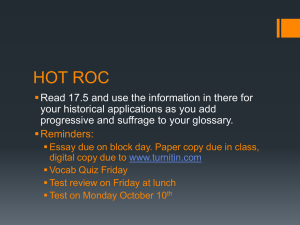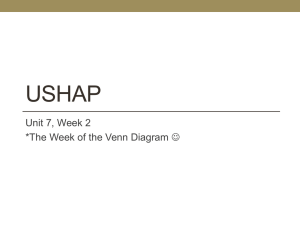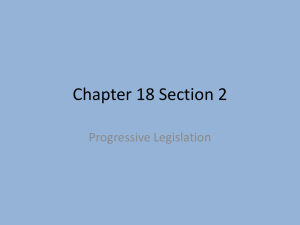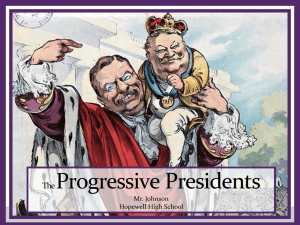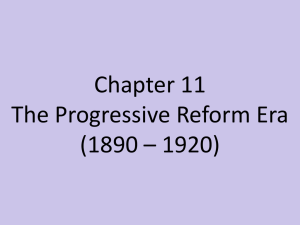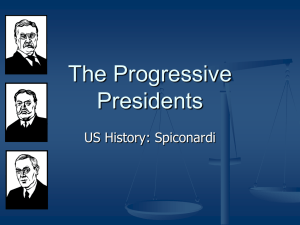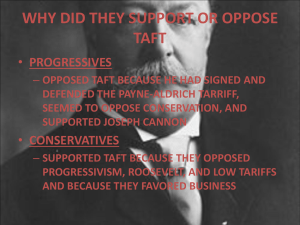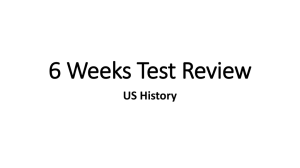The Progressive Presidents 10/4
advertisement
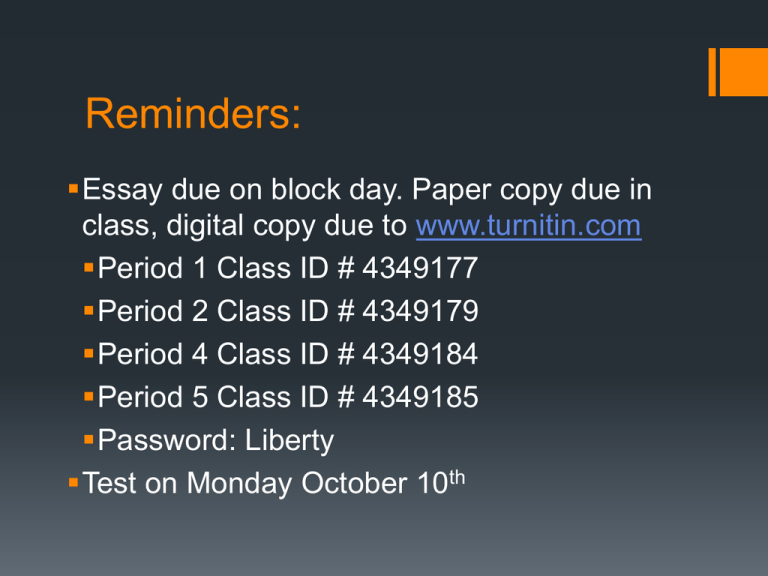
Reminders: Essay due on block day. Paper copy due in class, digital copy due to www.turnitin.com Period 1 Class ID # 4349177 Period 2 Class ID # 4349179 Period 4 Class ID # 4349184 Period 5 Class ID # 4349185 Password: Liberty Test on Monday October 10th In-Text Citation At the dawn of the 20th century, democracy in the United States was at a crossroads. Giant monopolies dominated the economy and held corrupt politicians in their pockets, while the working class suffered to barely survive. One can find evidence of this stark contrast in the tenement housing of New York’s Lower East Side. Here, multiple families lived in small damp and unsafe dwellings at a density of 300,000 people per square mile, while the city as a whole was more at a rate of 90,000 per square mile (Hart, 208). Website – (www.websitename.com) - stop at the first / Match the reform with its modern day equivalent. Progressive Reforms for State Government 1.Secret ballots and private voting booths 2.Voters select their candidates in a primary rather than have political parties select the candidates. 3.Recalls allow voters to remove a corrupt or disliked elected official if enough people sign a petition to create a special election. 4.Initiatives allow people to propose their own laws to be voted on by people on the election day ballot. 5.Referendum allows state legislatures to have their ideas put to a vote of the people in the states on the election ballot. Activity Bank a. Barack Obama wins the Democratic party nomination. b. Same-sex marriage is made illegal in the state of CA. c. Arnold Schwarznegger takes over the CA governorship in 2003 after a special election. d. Electronic voting machines are disputed because they don’t leave records of how someone voted. e. State legislatures ask voters to approve gambling on Native American reservations Match the reform with its modern day equivalent. Progressive Reforms for State Government 1.Secret ballots and private voting booths (D) 2.Voters select their candidates in a primary rather than have political parties select the candidates. (A) 3.Recalls allow voters to remove a corrupt or disliked elected official if enough people sign a petition to create a special election. (C) 4.Initiatives allow people to propose their own laws to be voted on by people on the election day ballot. (B) 5.Referendum allows state legislatures to have their ideas put to a vote of the people in the states on the election ballot. (E) Activity Bank a. Barack Obama wins the Democratic party nomination. b. Same-sex marriage is made illegal in the state of CA. c. Arnold Schwarznegger takes over the CA governorship in 2003 after a special election. d. Electronic voting machines are disputed because they don’t leave records of how someone voted. e. State legislatures ask voters to approve gambling on Native American reservations HOT ROC: Confronting Racism in the Progressive Era How should issues of race and racism be addressed in American society? Read and respond to DuBois and Washington excerpts from pgs 228 & 229. Which perspective do you agree most with and why? The Progressive Presidents Roosevelt - Taft - Wilson Directions Use 18.2, 18.3, 18.4 (p.232-239) to find out what Progressive reforms each of the Progressive Presidents did and what similarities/differences the Presidents had between each other. Think of: Political reforms Economic reforms Social reforms Create groups of 3 people, with each person having notes on a different president, Roosevelt, Taft & Wilson. Discuss reforms enacted by the presidents and find their similarities between them. Reminders: Essay due TODAY. digital copy due to www.turnitin.com by 5pm Tomorrow Period 1 Class ID # 4349177 Period 2 Class ID # 4349179 Period 4 Class ID # 4349184 Period 5 Class ID # 4349185 Password: Liberty Test on Monday October 10th Directions Use 18.2, 18.3, 18.4 (p.232-239) to find out what Progressive reforms each of the Progressive Presidents did and what similarities/differences the Presidents had between each other. Think of: Political reforms Economic reforms Social reforms Create groups of 3 people, with each person having notes on a different president, Roosevelt, Taft & Wilson. Discuss reforms enacted by the presidents and find their similarities between them. Answer Key Political Reforms Teddy Roosevelt 1901-1908 Square Deal- big business reform Economic Sherman Anti Trust Reforms Act Hepburn Act- The Fed. Gov. could set railroad rates Arbitration for steel workers Social Reforms Meat Inspection Act, Pure Food and Drug Act (FDA) US Forest Serviceset aside land for national forests William Taft 1908-1912 Wanted to limit the power of big corporations Lawsuits against trusts Woodrow Wilson 1912-1921 New Freedom: limited the power of trusts Clayton antitrust act- limit trusts even more, protected labor unions 19th Amendment- Suffrage Similarities Low tariff platform in his campaignhowever in 1909 he raised tariffsupset Progressives Tariff Reform Created the Federal Trade Commission Federal Reserve (The Fed) 16th Amendment- income tax 17th Amendment- direct election Taft and Wilson wanted to reform the banking system Added land to national forests, Children’s Bureau National wildlife refuge Keating-Owen Child Labor Act National Park Service 18th AmendmentProhibition All three did not worry about racial tensions in the US. Taft and Wilson set up 8 hour workdays Roosevelt supported Taft in the 1908 election. All presidents wanted to reform big business Roosevelt and Wilson sympathetic to women’s right to vote New Vocab Suffrage Election Wrap Up: The Election of 1912 *Add this information to your venn diagram Candidates Roosevelt: Republican President 1901-1908 Wanted Republican nomination, failed to get it, created Progressive “Bull Moose” party Taft: Incumbent Republican President 1908-1912 Wilson Democrat And…Eugene Debs- Socialist Results Putting it all together The Century: Seeds of Change Part 1: Start at 6:13 http://www.youtube.com/watch?v=jEcpJQxtswA Part 2: http://www.youtube.com/watch?v=2IepTBls1uk&feature=related Part 3: http://www.youtube.com/watch?v=dae7QI6gIsA&feature=related
